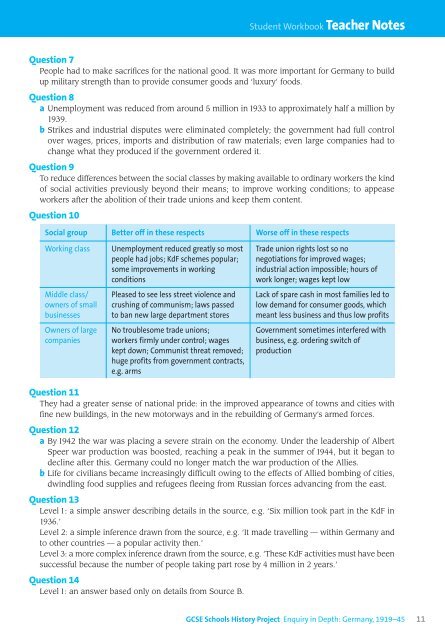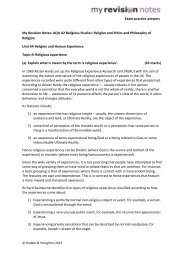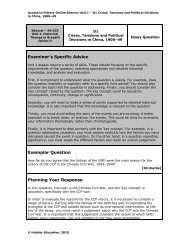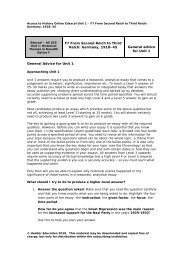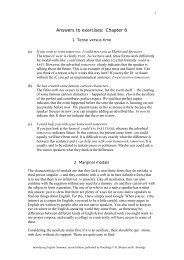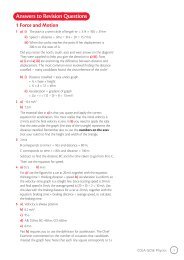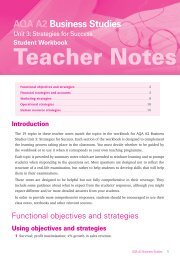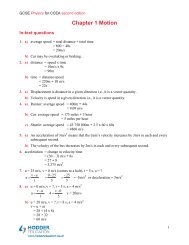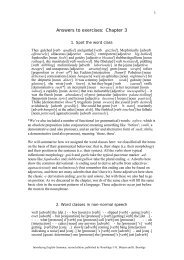GCSE Schools History Project Enquiry in Depth - Hodder Plus Home
GCSE Schools History Project Enquiry in Depth - Hodder Plus Home
GCSE Schools History Project Enquiry in Depth - Hodder Plus Home
Create successful ePaper yourself
Turn your PDF publications into a flip-book with our unique Google optimized e-Paper software.
Student Workbook Teacher NotesQuestion 7People had to make sacrifices for the national good. It was more important for Germany to buildup military strength than to provide consumer goods and ‘luxury’ foods.Question 8a Unemployment was reduced from around 5 million <strong>in</strong> 1933 to approximately half a million by1939.b Strikes and <strong>in</strong>dustrial disputes were elim<strong>in</strong>ated completely; the government had full controlover wages, prices, imports and distribution of raw materials; even large companies had tochange what they produced if the government ordered it.Question 9To reduce differences between the social classes by mak<strong>in</strong>g available to ord<strong>in</strong>ary workers the k<strong>in</strong>dof social activities previously beyond their means; to improve work<strong>in</strong>g conditions; to appeaseworkers after the abolition of their trade unions and keep them content.Question 10Social groupWork<strong>in</strong>g classMiddle class/owners of smallbus<strong>in</strong>essesOwners of largecompaniesBetter off <strong>in</strong> these respectsUnemployment reduced greatly so mostpeople had jobs; KdF schemes popular;some improvements <strong>in</strong> work<strong>in</strong>gconditionsPleased to see less street violence andcrush<strong>in</strong>g of communism; laws passedto ban new large department storesNo troublesome trade unions;workers firmly under control; wageskept down; Communist threat removed;huge profits from government contracts,e.g. armsWorse off <strong>in</strong> these respectsTrade union rights lost so nonegotiations for improved wages;<strong>in</strong>dustrial action impossible; hours ofwork longer; wages kept lowLack of spare cash <strong>in</strong> most families led tolow demand for consumer goods, whichmeant less bus<strong>in</strong>ess and thus low profitsGovernment sometimes <strong>in</strong>terfered withbus<strong>in</strong>ess, e.g. order<strong>in</strong>g switch ofproductionQuestion 11They had a greater sense of national pride: <strong>in</strong> the improved appearance of towns and cities withf<strong>in</strong>e new build<strong>in</strong>gs, <strong>in</strong> the new motorways and <strong>in</strong> the rebuild<strong>in</strong>g of Germany’s armed forces.Question 12a By 1942 the war was plac<strong>in</strong>g a severe stra<strong>in</strong> on the economy. Under the leadership of AlbertSpeer war production was boosted, reach<strong>in</strong>g a peak <strong>in</strong> the summer of 1944, but it began todecl<strong>in</strong>e after this. Germany could no longer match the war production of the Allies.b Life for civilians became <strong>in</strong>creas<strong>in</strong>gly difficult ow<strong>in</strong>g to the effects of Allied bomb<strong>in</strong>g of cities,dw<strong>in</strong>dl<strong>in</strong>g food supplies and refugees flee<strong>in</strong>g from Russian forces advanc<strong>in</strong>g from the east.Question 13Level 1: a simple answer describ<strong>in</strong>g details <strong>in</strong> the source, e.g. ‘Six million took part <strong>in</strong> the KdF <strong>in</strong>1936.’Level 2: a simple <strong>in</strong>ference drawn from the source, e.g. ‘It made travell<strong>in</strong>g — with<strong>in</strong> Germany andto other countries — a popular activity then.’Level 3: a more complex <strong>in</strong>ference drawn from the source, e.g. ‘These KdF activities must have beensuccessful because the number of people tak<strong>in</strong>g part rose by 4 million <strong>in</strong> 2 years.’Question 14Level 1: an answer based only on details from Source B.<strong>GCSE</strong> <strong>Schools</strong> <strong>History</strong> <strong>Project</strong> <strong>Enquiry</strong> <strong>in</strong> <strong>Depth</strong>: Germany, 1919–4511


